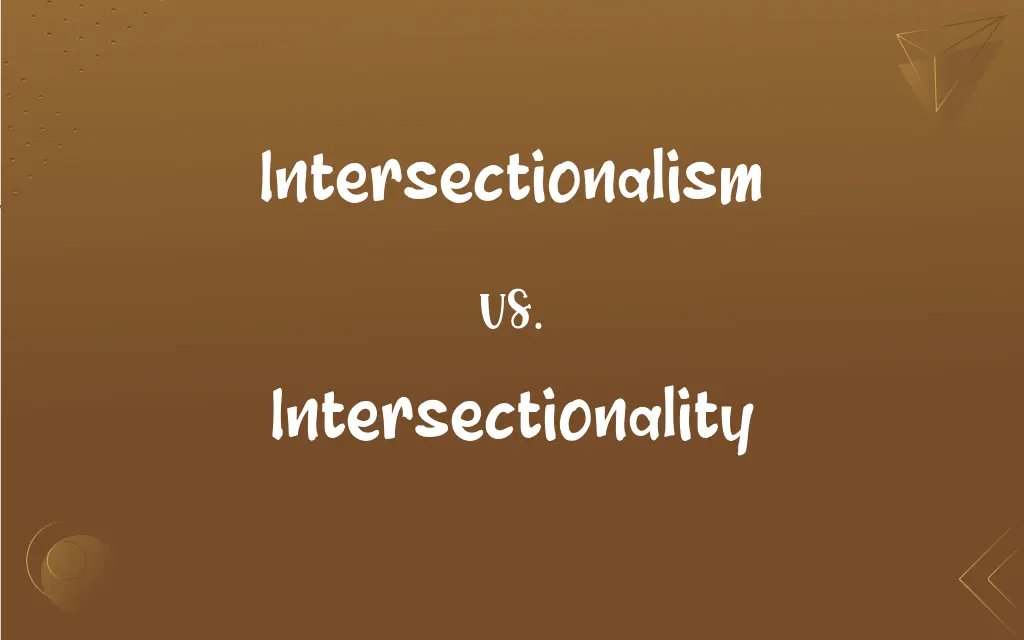Intersectionalism vs. Intersectionality: What's the Difference?
By Aimie Carlson || Updated on May 23, 2024
Intersectionalism is the theoretical framework examining how various social identities overlap, while intersectionality specifically addresses how these overlapping identities impact experiences of oppression and privilege.

Key Differences
Intersectionalism is the broader theoretical framework that examines how different social identities, such as race, gender, and class, intersect and interact. This framework aims to understand the complexity of identities and how they shape an individual's experiences. Intersectionality, on the other hand, focuses specifically on how these intersecting identities influence experiences of discrimination and privilege. It addresses the compounded effects of multiple identities, particularly in the context of systemic oppression.
While intersectionalism provides a general approach to studying overlapping identities, intersectionality is more concerned with the practical implications and lived experiences of these intersections. Intersectionality looks at the real-world consequences and systemic issues that arise from these overlapping identities.
In academic discourse, intersectionalism serves as the theoretical foundation, whereas intersectionality is often used to discuss the practical applications and effects of these theories in society. Intersectionality is a key term in social justice movements, emphasizing the need to consider multiple identity factors simultaneously.
Both terms are crucial in understanding the complexities of identity and oppression, but intersectionality is more commonly used in discussions about addressing inequalities and advocating for social change. Intersectionalism provides the analytical tools, while intersectionality drives the activism and policy discussions.
Comparison Chart
Focus
Overlapping social identities
Impact of overlapping identities on oppression
ADVERTISEMENT
Application
Theoretical framework
Practical implications and lived experiences
Usage
Academic discourse
Social justice movements
Aim
Understanding complexity of identities
Addressing systemic issues and inequalities
Emphasis
Analysis and study
Activism and policy advocacy
Intersectionalism and Intersectionality Definitions
Intersectionalism
A method for understanding the cumulative impact of social identities.
Through intersectionalism, the unique challenges faced by marginalized groups can be better understood.
ADVERTISEMENT
Intersectionality
An analytical tool for exploring the effects of overlapping social identities.
Intersectionality is crucial in discussions about gender equality.
Intersectionalism
Analysis of the interplay between different social categories.
Intersectionalism reveals the multifaceted nature of individual identities.
Intersectionality
The concept of overlapping social identities impacting oppression and privilege.
Intersectionality highlights how a black woman may face different challenges than a white woman.
Intersectionalism
A theoretical framework for examining the overlap of social identities.
Intersectionalism helps scholars understand how race and gender intersect in society.
Intersectionality
A framework for examining how multiple identities influence social experiences.
Intersectionality helps to identify and combat various forms of discrimination.
Intersectionalism
The study of how various social identities combine to shape experiences.
Researchers use intersectionalism to explore the complexities of identity.
Intersectionality
A lens for understanding the compounded effects of multiple identities.
Activists use intersectionality to address issues affecting diverse communities.
Intersectionalism
An approach to studying the interconnectedness of social categories.
Intersectionalism allows for a deeper analysis of systemic inequality.
Intersectionality
The interconnected nature of social categorizations in creating discrimination.
Intersectionality shows how economic status and ethnicity can affect one’s opportunities.
Intersectionalism
The study of minorities within minorities, or intersections between minorities; specifically, the study of the interactions of multiple systems of oppression or discrimination.
Intersectionality
A framework for understanding how multiple categories of identity (such as gender, race, and class) interact in ways that create complex systems of oppression and power.
Intersectionality
The phenomenon resulting from such interactions.
Intersectionality
The quality or state of being intersectional, that is, of being characterized by intersection (especially of multiple forms of discrimination).
The intersectionality of these issues
The intersectionality of race, gender, class, ethnicity, age, generation, marital status, and place of origin
Intersectionality
The study of (or a sociological methodology of studying) overlapping or intersecting social identities and related systems of oppression, domination, or discrimination.
FAQs
How do intersectionalism and intersectionality differ?
Intersectionalism is the theoretical study of intersecting identities, while intersectionality focuses on the practical implications of these intersections.
What is intersectionality?
Intersectionality examines how overlapping social identities impact experiences of oppression and privilege.
Can intersectionalism be applied outside of social sciences?
Yes, it can be used in various fields to understand the complexity of identities and their interactions.
How does intersectionality impact policy-making?
It informs policies that consider the compounded effects of multiple forms of discrimination.
What are some examples of intersecting identities?
Race, gender, class, sexuality, and disability status are common intersecting identities.
How does intersectionality address systemic oppression?
By highlighting how multiple identities interact to exacerbate discrimination.
Who coined the term intersectionality?
Kimberlé Crenshaw, a legal scholar and civil rights advocate, coined the term in 1989.
Is intersectionalism a recent concept?
While the term is relatively new, the ideas behind it have been discussed in various forms for decades.
What is intersectionalism?
Intersectionalism is a theoretical framework for analyzing how various social identities intersect and interact.
Can intersectionalism be used in workplace diversity programs?
Yes, it helps in creating inclusive policies that consider various employee identities.
Why is intersectionality important in social justice?
It highlights the need to consider multiple identity factors in addressing inequalities.
How does intersectionalism enhance research?
It provides a comprehensive approach to studying the complexities of identity.
Can intersectionalism and intersectionality be used interchangeably?
Not exactly; intersectionalism is more theoretical, while intersectionality focuses on practical impacts.
What is an example of intersectionality in action?
Addressing wage gaps by considering both gender and race.
Is intersectionality relevant in education?
Yes, it informs inclusive teaching practices and curricula.
How does intersectionality benefit marginalized groups?
It provides a framework for understanding and combating multiple layers of discrimination.
What role does intersectionality play in feminism?
It ensures that feminist movements address the diverse experiences of all women.
How do activists use intersectionality?
They use it to advocate for policies that address the needs of diverse communities.
What are the criticisms of intersectionality?
Some argue it can be too complex or divisive, while others believe it essential for thorough analysis.
What is the future of intersectionalism in academia?
It will likely continue to evolve and inform studies on identity and inequality.
About Author
Written by
Aimie CarlsonAimie Carlson, holding a master's degree in English literature, is a fervent English language enthusiast. She lends her writing talents to Difference Wiki, a prominent website that specializes in comparisons, offering readers insightful analyses that both captivate and inform.































































